Cuba USA
Sprint, a U.S. corporation with funds from the U.S. National Science Foundation, provided Cuba's first Internet link.
Samantha Power, the U.S. Ambassador to the United Nations, praised Cuba for their contribution to the fight against ebola during a panel discussion at the ebola crisis at the Manhattan headquarters of Thomson Reuters.
She just returned from a fact finding trip to West Africa and said of Cuba
I'm posting this in a blog on the Internet in Cuba because it reminds me of the collaboration and friendship of Cuban and American networking technicians during the pre and early-Internet days.
The day Cuba established its first IP connection to the Internet, Jesus Martinez, Director of Cuba's National Center of Automated Data Exchange (CENIAI), the organization responsible for networking at that time posted a statement saying
At that time, American networnkers were welcome visitors at CENIAI and at Cuba's Informatica conference and Cubans and Americans and others attended and taught in the Internet Society's annual Developing Country Workshops and conferences. There was no politics and no big money, just a common belief in the importance of the Internet.
Martinez and his colleagues were not politicians seeking power or representatives of corporations seeking monopoly profits, they were technicians and others who believed that computer networks were fascinating and held great potential for improving the world. They may have been naive, but one has to respect them and we owe the same to any medical professional coming to West Africa to treat ebola patients.
-----
Update 11/12/2014
Wall Street columnist Mary Anastasia O’Grady says Havana earns almost $8 billion a year off the backs of the health workers it sends to poor countries. She says Cuba is well paid for sending doctors abroad and the doctors themselves get very little. O'Grady calls this "slave trade," which sounds like click bait, and Listening to the interview, it seems that a lot of her conclusions are speculative. You can see the interview for yourself here:
If you are a Wall Street Journal subscriber, you can read her column here.
A reader of this blog, who is a Cuba-trained physician now living in the US, has told me Cuban doctors are eager to go abroad because there is nothing for them to do in Cuba. O'grady paints a different picture. I have no reliable way to form an opinion -- just passing these links along.
-----
Update 5/8/2015
Americans and Cubans collaborated in the early days of the Internet and during the Ebola epidemic. Ebola killed thousands and it (literally) decimated the tiny health-care workforces of Liberia, Sierra Leone and Guinea.
In a Foreign Affairs article, Laurie Garrett proposes combining the resources of the US and Cuba's Latin American Medical School (ELAM) in training medical professionals.
As the Ebola epidemic showed us, this is a global problem, not an African problem.
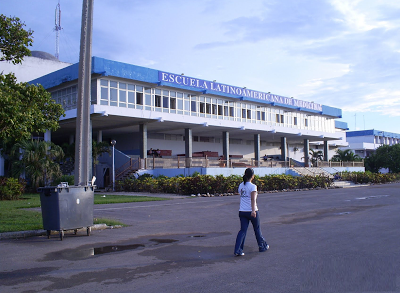
- Ebola And The Real Health Crisis In The Us
by Mumia Abu-Jamal With the death of Mr. Thomas Eric Duncan shortly after his arrival from Liberia, West Africa, the Ebola crisis has burst onto millions of news screens, generating deep levels of fear and xenophobia. To be sure, Ebola is a serious health...
- Obama’s Cynical, Stilted Response To Ebola Vs. Cuba’s Magnificent Mobilization
By Black Agenda Report executive editor Glen FordSource: Black Agenda Report “After centuries of fattening the colonial bat, the Ebola-afflicted countries have almost no structural defenses against even the tiniest invaders.” The World Health Organization...
- Sprint Connected Cuba In 1996, How About 2016?
Does Sprint have an advantage over other US companies? Journalist Mark Walsh (@markfwal) sent me an interesting conjecture -- perhaps Sprint is well positioned to play a role in Cuba's mobile connectivity. He pointed out that Sprint already offers...
- Ceniai Staff Photo Taken In 1990
CENIAI -- The Center for Automatic Interchange of Information -- was Cuba's networking link to the Soviet bloc during the pre-Internet days. The CENIAI staff understood the potential importance of networking for Cuba and were enthusiastic members...
- Cuba's First Internet Connection
Jesus Martinez (l) and Internet pioneer Vint CerfCuba's first Internet connection was made in September 1996. CENIAI, the National Center of Automated Data Exchange, installed and managed the link. As was the custom in those days, CENIAI Director...
Cuba USA
When Cubans and Americans have cooperated
Sprint, a U.S. corporation with funds from the U.S. National Science Foundation, provided Cuba's first Internet link.
Samantha Power, the U.S. Ambassador to the United Nations, praised Cuba for their contribution to the fight against ebola during a panel discussion at the ebola crisis at the Manhattan headquarters of Thomson Reuters.
She just returned from a fact finding trip to West Africa and said of Cuba
I think they announced that going on almost two months ago, And they are sending another 200 on top of that 265. That is a big gap and a big need.She also said it gave her great pride
To see these Americans or Europeans or Cubans or whoever it is in their full protective gear, in the scorching heat, working two-hours shifts, because that’s all you can tolerate being in that suit.When the moderator asked a leading question about US relations with Cuba, she answered
There’s no integrated effort, in part because the UN is doing the command and control. But we’re very grateful to them for doing this.Below, you see two Cuban doctors at the largest of 17 ebola treatment units (ETUs) in Liberia, which will be mainly operated by Cuban doctors and nurses. It is noteworthy that the picture was posted on the Voice of America Web site and funding is from USAID.
I'm posting this in a blog on the Internet in Cuba because it reminds me of the collaboration and friendship of Cuban and American networking technicians during the pre and early-Internet days.
The day Cuba established its first IP connection to the Internet, Jesus Martinez, Director of Cuba's National Center of Automated Data Exchange (CENIAI), the organization responsible for networking at that time posted a statement saying
After so many days, years of sacrifice and vigilance, I have great satisfaction to announce that our beloved Cuba, our "caiman of the Indies," has been connected to the Internet as we had desired. We have a 64 Kbps link to Sprint in the U.S.Sprint, a U.S. corporation, subsidized by funds from the U.S. National Science Foundation, provided Cuba's first Internet link.
At that time, American networnkers were welcome visitors at CENIAI and at Cuba's Informatica conference and Cubans and Americans and others attended and taught in the Internet Society's annual Developing Country Workshops and conferences. There was no politics and no big money, just a common belief in the importance of the Internet.
Martinez and his colleagues were not politicians seeking power or representatives of corporations seeking monopoly profits, they were technicians and others who believed that computer networks were fascinating and held great potential for improving the world. They may have been naive, but one has to respect them and we owe the same to any medical professional coming to West Africa to treat ebola patients.
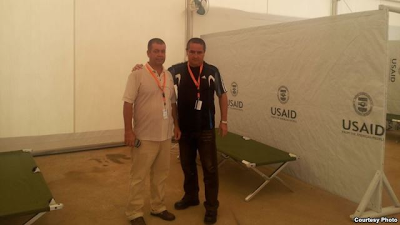 |
| Cuban doctors and USAID in Liberia |
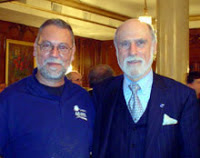 |
| Jesus Maritnez and Internet pioneer Vint Cerf |
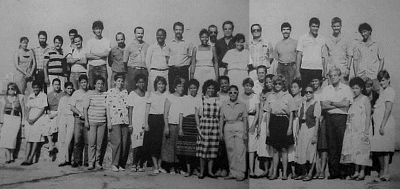 |
| CENIAI staff, 1990 |
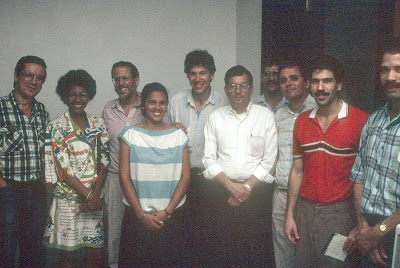 |
| American visitors at CENIAI |
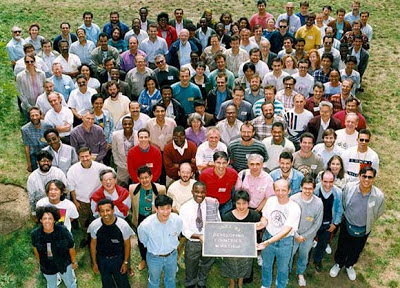 |
| Internet Society Developing Nations Workshop, 1993 |
-----
Update 11/12/2014
Wall Street columnist Mary Anastasia O’Grady says Havana earns almost $8 billion a year off the backs of the health workers it sends to poor countries. She says Cuba is well paid for sending doctors abroad and the doctors themselves get very little. O'Grady calls this "slave trade," which sounds like click bait, and Listening to the interview, it seems that a lot of her conclusions are speculative. You can see the interview for yourself here:
If you are a Wall Street Journal subscriber, you can read her column here.
A reader of this blog, who is a Cuba-trained physician now living in the US, has told me Cuban doctors are eager to go abroad because there is nothing for them to do in Cuba. O'grady paints a different picture. I have no reliable way to form an opinion -- just passing these links along.
-----
Update 5/8/2015
Americans and Cubans collaborated in the early days of the Internet and during the Ebola epidemic. Ebola killed thousands and it (literally) decimated the tiny health-care workforces of Liberia, Sierra Leone and Guinea.
In a Foreign Affairs article, Laurie Garrett proposes combining the resources of the US and Cuba's Latin American Medical School (ELAM) in training medical professionals.
Combining the money, logistics, and talent of the United States, Cuba, Sierra Leone, Guinea, and Liberia to rapidly train a team of new doctors for the West African nations offers the most cost-effective, swift, and appropriate means to solve the health systems crisis faced in the Ebola-hit countries.If you are not familiar with ELAM, watch this TED Talk by Gail Reed. (I have read charges that ELAM graduates do not pass exams at the same rate as those of US medical schools, but ELAM is devoted to training healthcare workers to deliver care that is appropriate to developing nations).
As the Ebola epidemic showed us, this is a global problem, not an African problem.

- Ebola And The Real Health Crisis In The Us
by Mumia Abu-Jamal With the death of Mr. Thomas Eric Duncan shortly after his arrival from Liberia, West Africa, the Ebola crisis has burst onto millions of news screens, generating deep levels of fear and xenophobia. To be sure, Ebola is a serious health...
- Obama’s Cynical, Stilted Response To Ebola Vs. Cuba’s Magnificent Mobilization
By Black Agenda Report executive editor Glen FordSource: Black Agenda Report “After centuries of fattening the colonial bat, the Ebola-afflicted countries have almost no structural defenses against even the tiniest invaders.” The World Health Organization...
- Sprint Connected Cuba In 1996, How About 2016?
Does Sprint have an advantage over other US companies? Journalist Mark Walsh (@markfwal) sent me an interesting conjecture -- perhaps Sprint is well positioned to play a role in Cuba's mobile connectivity. He pointed out that Sprint already offers...
- Ceniai Staff Photo Taken In 1990
CENIAI -- The Center for Automatic Interchange of Information -- was Cuba's networking link to the Soviet bloc during the pre-Internet days. The CENIAI staff understood the potential importance of networking for Cuba and were enthusiastic members...
- Cuba's First Internet Connection
Jesus Martinez (l) and Internet pioneer Vint CerfCuba's first Internet connection was made in September 1996. CENIAI, the National Center of Automated Data Exchange, installed and managed the link. As was the custom in those days, CENIAI Director...
